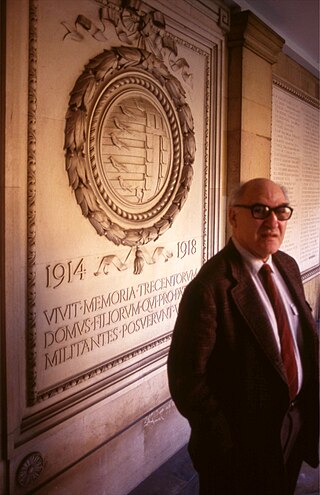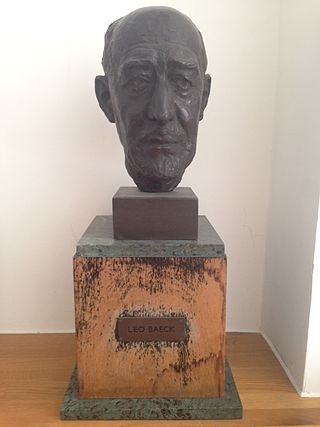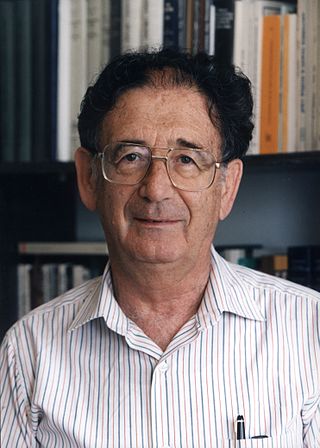
Gerhard "George" Lachmann Mosse was a German-American social and cultural historian, who emigrated from Nazi Germany to Great Britain and then to the United States. He was professor of history at the University of Iowa, the University of Wisconsin–Madison, and also in Israel, at the Hebrew University of Jerusalem. Best known for his studies of Nazism, he authored more than 25 books on topics as diverse as constitutional history, Protestant theology, and the history of masculinity. In 1966, he and Walter Laqueur founded The Journal of Contemporary History, which they co-edited.

Leo Baeck was a 20th-century German rabbi, scholar, and theologian. He served as leader of Reform Judaism in his native country and internationally, and later represented all German Jews during the Nazi era. After the Second World War, he settled in London, in the United Kingdom, where he served as the chairman of the World Union for Progressive Judaism. In 1955, the Leo Baeck Institute for the study of the history and culture of German-speaking Jewry was established, and Baeck was its first international president. The Leo Baeck Medal has been awarded since 1978 to those who have helped preserve the spirit of German-speaking Jewry in culture, academia, politics, and philanthropy.

Yehuda Bauer is a Czech-born Israeli historian and scholar of the Holocaust. He is a professor of Holocaust Studies at the Avraham Harman Institute of Contemporary Jewry at the Hebrew University of Jerusalem.
The Centralverein deutscher Staatsbürger jüdischen Glaubens was founded by German Jewish intellectuals on 26 March 1893 in Berlin, with the intention of opposing the rise of antisemitism in the German Empire. Shortly after its founding it had 1,420, and in 1926 approximately 60,000 members.

The World Union for Progressive Judaism (WUPJ) is the international umbrella organization for the various branches of Reform, Liberal and Progressive Judaism, as well as the separate Reconstructionist Judaism. The WUPJ is based in 40 countries with 1,275 affiliated synagogues, of which 1,170 are Reform, Progressive, or Liberal and 105 Reconstructionist. It claims to represent a total of some 1.8 million people, both registered constituents and non-member identifiers. The WUPJ states that it aims to create common ground between its constituents and to promote Progressive Judaism in places where individuals and groups are seeking authentic, yet modern ways of expressing themselves as Jews. It seeks to preserve Jewish integrity wherever Jews live, to encourage integration without assimilation, to deal with modernity while preserving the Jewish experience, and to strive for equal rights and social justice.

John Ashley Soames Grenville was a historian of the modern world.
British Jews are British citizens who are Jewish. The number of people who identified as Jews in the United Kingdom rose by just under 4% between 2001 and 2021.

Alexander Altmann was an Orthodox Jewish scholar and rabbi born in Kassa, Austria-Hungary. He emigrated to England in 1938 and later settled in the United States, working productively for a decade and a half as a professor within the Philosophy Department at Brandeis University. He is best known for his studies of the thought of Moses Mendelssohn, and was indeed the leading Mendelssohn scholar since the time of Mendelssohn himself. He also made important contributions to the study of Jewish mysticism, and for a large part of his career he was the only scholar in the United States working on this subject in a purely academic setting. Among the many Brandeis students whose work he supervised in this area were Elliot Wolfson, Arthur Green, Heidi Ravven, Paul Mendes-Flohr, Lawrence Fine, and Daniel Matt.

Robert Weltsch was a journalist, editor and prominent Zionist.
The Leo Baeck Medal has been awarded since 1978 by the Leo Baeck Institute of New York City, an international research institute devoted to the study of the history and culture of German-speaking Jewry. It is the highest recognition the Institute bestows upon those who have helped preserve the spirit of German-speaking Jewry in culture, academia, politics, and philanthropy.

The Leo Baeck Institute, established in 1955, is an international research institute with centres in New York City, London, Jerusalem and Berlin, that are devoted to the study of the history and culture of German-speaking Jewry. The institute was founded in 1955 by a consortium of influential Jewish scholars including Hannah Arendt, Martin Buber and Gershom Scholem. The Leo Baeck Medal has been awarded since 1978 to those who have helped preserve the spirit of German-speaking Jewry in culture, academia, politics, and philanthropy.

Deborah Hertz, is an American historian whose specialties are modern German history, modern Jewish history and modern European women's history. Her current research focuses on the history of radical Jewish women.
Antony Lerman is a British writer who specialises in the study of antisemitism, the Israeli–Palestinian conflict, multiculturalism, and the place of religion in society. From 2006 to early 2009, he was Director of the Institute for Jewish Policy Research, a think tank on issues affecting Jewish communities in Europe. From December 1999 to 2006, he was Chief Executive of the Hanadiv Charitable Foundation, renamed the Rothschild Foundation Europe in 2007. He is a founding member of the Jewish Forum for Justice and Human Rights, and a former editor of Patterns of Prejudice, a quarterly academic journal focusing on the sociology of race and ethnicity.
Julius Carlebach was a German-British rabbi and professor of sociology and history.

Werner van der Zyl was a rabbi in Berlin and in London, where he came in 1939 as a refugee rabbi from Germany. He was the prime mover and first director of studies of the Jewish Theological College of London. The college was inaugurated in 1956 and was renamed Leo Baeck College shortly afterwards at his suggestion.

The Leo Baeck Institute New York (LBI) is a research institute in New York City dedicated to the study of German-Jewish history and culture, founded in 1955. It is one of three independent research centers founded by a group of German-speaking Jewish émigrés at a conference in Jerusalem in 1955. The other Leo Baeck institutes are Leo Baeck Institute Jerusalem and Leo Baeck Institute London, and the activities of all three are coordinated by the board of directors of the Leo Baeck Institute. It is also a founding partner of the Center for Jewish History, and maintains a research library and archive in New York City that contains a significant collection of source material relating to the history of German-speaking Jewry, from its origins to the Holocaust, and continuing to the present day. The Leo Baeck Medal has been awarded by the institute since 1978 to those who have helped preserve the spirit of German-speaking Jewry in culture, academia, politics, and philanthropy.

Otto Dov Kulka was an Israeli historian, professor emeritus of the Hebrew University of Jerusalem. His primary areas of specialization were the study of modern antisemitism from the early modern age until its manifestation under the National-Socialist regime as the "Final Solution"; Jewish thought in Europe – and Jews in European thought – from the 16th to the 20th century; Jewish-Christian relations in modern Europe; the history of the Jews in Germany; and the study of the Holocaust.
David Sorkin is the Lucy G. Moses professor of Jewish history at Yale University. Sorkin specializes in the intersection of Jewish and European history, and has published several prominent books including Jewish Emancipation: A History Across Five Centuries.
The Leo Baeck Institute Jerusalem for the Study of German and Central European Jewry, founded in 1955, is a research institute based in Jerusalem, Israel. While affiliated with the Leo Baeck Institute and its affiliates in New York/Berlin and London, it is an independent organization under Israeli law. Since 2019, the institute has been led by Galili Shaḥar.
Arnold Paucker, OBE was a Jewish German-English historian. He was the long-time editor of the Leo Baeck Institute Year Book, published by the Leo Baeck Institute London.













